

The Bonus Effect. For nearly half a century, research has raised troubling questions about the practice of dangling rewards in front of people to get them to do what we want.
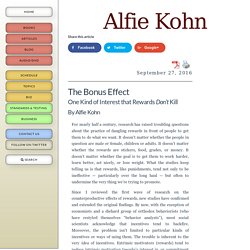
It doesn’t matter whether the people in question are male or female, children or adults. It doesn’t matter whether the rewards are stickers, food, grades, or money. It doesn’t matter whether the goal is to get them to work harder, learn better, act nicely, or lose weight. What the studies keep telling us is that rewards, like punishments, tend not only to be ineffective — particularly over the long haul — but often to undermine the very thing we’re trying to promote.Since I reviewed the first wave of research on the counterproductive effects of rewards, new studies have confirmed and extended the original findings.
Mysimpleshow - create your own explainer video in minutes. 7 Meaningful Classroom Engagement Strategies for Student Connection. Building student connection means building trust and ensuring the best learning outcomes.
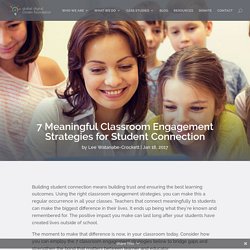
Using the right classroom engagement strategies, you can make this a regular occurrence in all your classes. Teachers that connect meaningfully to students can make the biggest difference in their lives. It ends up being what they’re known and remembered for. The positive impact you make can last long after your students have created lives outside of school. The moment to make that difference is now, in your classroom today. 1. Our kids live in a different world today. Student culture includes a number of different subcultures to look at. 2. This is one of those classroom engagement strategies that can work wonders if you do it right. Of course, you must choose what you say discriminately. If the reaction to any of these things isn’t instantaneous or earth-shattering, don’t worry. 3. FFM is something of a trend in business and social engagements. Think about it for a minute. 4. Harvard Education Publishing Group. Students in Hayley Dupuy’s sixth-grade science class at the Jane Lathrop Stanford Middle School in Palo Alto, Calif., are beginning a unit on plate tectonics.
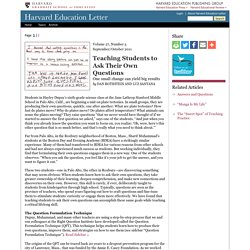
In small groups, they are producing their own questions, quickly, one after another: What are plate tectonics? How fast do plates move? Why do plates move? Do plates affect temperature? What animals can sense the plates moving? Far from Palo Alto, in the Roxbury neighborhood of Boston, Mass., Sharif Muhammad’s students at the Boston Day and Evening Academy (BDEA) have a strikingly similar experience. Levels of Understanding: Learning That Fits All. Have you ever tried on a "one-size-fits-all" article of clothing?
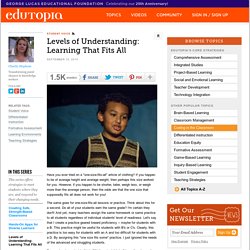
If you happen to be of average height and average weight, then perhaps this size worked for you. However, if you happen to be shorter, taller, weigh less, or weigh more than the average person, then the odds are that the one size that supposedly fits all does not work for you! The same goes for one-size-fits-all lessons or practice. Think about this for a second.
Digital Promise Challenge Based Learning – Take Action. Make a Difference. Want Your Kids to Build the Next Airbnb, Snapchat, or Uber? Teach Them This Skill. 6 Design Principles Of Connected Learning. The Learning And Design Principles Of Connected Learning by Terry Heick.
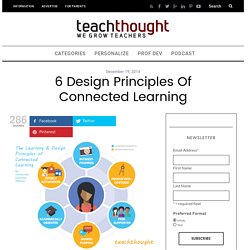
10 ways to encourage student reflection… – What Ed Said. Split Screen Teaching Optimal learning occurs when students are active participants in their own learning, rather than passive recipients of teacher-delivered content.
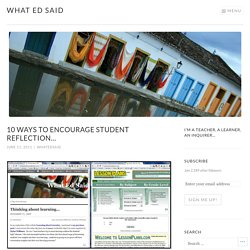
For this to be effective, students really need to think about their learning. I worked with a group of teachers recently who felt their young students were not capable of writing meaningful reflections for their end of semester reports. That might be true. But only if reflection and meta-cognition are not integral parts of the learning in their classes. Should we focus on teaching or learning? – What Ed Said. “Inquiry happens when you focus on the art of teaching.”
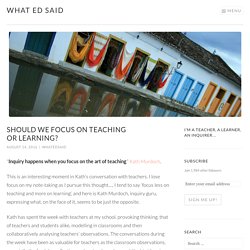
Kath Murdoch. This is an interesting moment in Kath’s conversation with teachers. I lose focus on my note-taking as I pursue this thought… I tend to say ‘focus less on teaching and more on learning’, and here is Kath Murdoch, inquiry guru, expressing what, on the face of it, seems to be just the opposite. Kath has spent the week with teachers at my school, provoking thinking, that of teachers and students alike, modelling in classrooms and then collaboratively analysing teachers’ observations.
The conversations during the week have been as valuable for teachers as the classroom observations, especially the final day reflections, when teachers draw out the big ideas in response to Kath’s question: What does it mean to have an inquiry stance in our teaching? After the session, I attempt to categorise the teachers’ ideas under conceptual headings. Language: Use a language of learning not compliance. Digital Formative Assessments! Options to use during a lesson cycle to assess learning Digital Formative Assessment: Tools for Teachers Birdville ISD embraces the PLC cycle and encourages teachers to constantly monitor, assess, and re-teach.
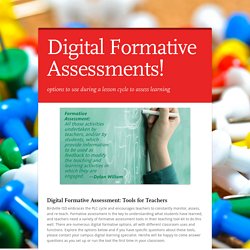
Formative assessment is the key to understanding what students have learned, and teachers need a variety of formative assessment tools in their teaching tool-kit to do this well. There are numerous digital formative options, all with different classroom uses and functions. Explore the options below and if you have specific questions about these tools, please contact your campus digital learning specialist. A Variety of Tools for Your Tool-box.
The Most Important Things About Using Formative Assessment. The End of Average: Todd Rose's '8 for 8' Notes: Personality for inquiry based teaching. Do You have the Personality To Be an Inquiry-Based Teacher?